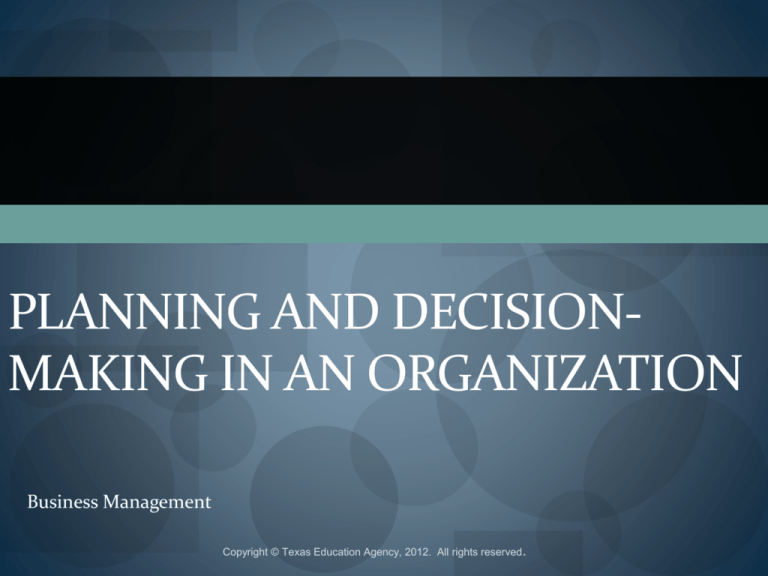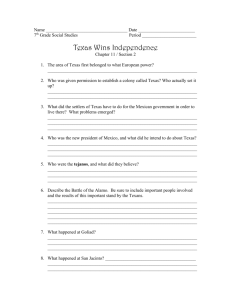
PLANNING AND DECISIONMAKING IN AN ORGANIZATION
Business Management
Copyright © Texas Education Agency, 2012. All rights reserved.
“Copyright and Terms of Service
Copyright © Texas Education Agency. The materials found on this website are copyrighted © and trademarked ™ as
the property of the Texas Education Agency and may not be reproduced without the express written permission of the
Texas Education Agency, except under the following conditions:
1) Texas public school districts, charter schools, and Education Service Centers may reproduce and use copies of the
Materials and Related Materials for the districts’ and schools’ educational use without obtaining permission from the
Texas Education Agency;
2) Residents of the state of Texas may reproduce and use copies of the Materials and Related Materials for individual
personal use only without obtaining written permission of the Texas Education Agency;
3) Any portion reproduced must be reproduced in its entirety and remain unedited, unaltered and unchanged in any
way;
4) No monetary charge can be made for the reproduced materials or any document containing them; however, a
reasonable charge to cover only the cost of reproduction and distribution may be charged.
Private entities or persons located in Texas that are not Texas public school districts or Texas charter schools or any
entity, whether public or private, educational or non-educational, located outside the state of Texas MUST obtain written
approval from the Texas Education Agency and will be required to enter into a license agreement that may involve the
payment of a licensing fee or a royalty fee.
2
Copyright (c) Texas Education Agency, 2012. All rights reserved.
Management Functions
Planning-setting
goals, reviewing
information, and
making decisions
Controllingdetermining the
status of whether or
not goals from the
planning stage have
been met
Implementingcarrying out
leadership activities
in an organization
3
Organizingcoordinating
resources needed to
achieve goals
Staffing-actions
necessary for hiring,
training, and
compensating
employees
Copyright © Texas Education Agency, 2012. All rights reserved.
Reasons for Decision-Making
Routine, daily
decisions
When problems
arise
When change is
anticipated
4
Copyright © Texas Education Agency, 2012. All rights reserved.
Types of Planning
Strategic
5
Operational
Long-term
planning
Short-term
planning
Broad goals
Specific
goals
Company as
a whole
Distinct
areas of a
company
Copyright © Texas Education Agency, 2012. All rights reserved.
Strategic Planning Examples
Business
Building factories
Expanding the business
School
College planning
Career planning
6
Copyright © Texas Education Agency, 2012. All rights reserved.
Strategic Planning – SWOT Analysis
SWOT Analysis
Assists in analysis for long-term decision-making
Strengths, Opportunities, Weaknesses, Threats
Strengths
Opportunities
-What works well
-Positive aspects
-Existing skills
-New ideas
-New needs of customers
-New angles to examine
Weaknesses
Threats
-Why are you losing money?
-What do you lack?
-What could you do better?
7
-Are there negative trends?
-Competitors?
-How is the economy
impacting your business?
Copyright © Texas Education Agency, 2012. All rights reserved.
Cost-Benefit Analysis
•Following are examples of possible costs and benefits
Benefits
Costs
Tangible:
1)Hiring employees
1)Increased sales
2)Purchasing inventories
2)Reduction in costs
Intangible:
8
Tangible:
Intangible:
1)More time involved
1)Customer satisfaction
2)Decreased employee
morale
2)Increased employee
morale
Copyright © Texas Education Agency, 2012. All rights reserved.
Operational Planning Examples
Budgeting
Inventories
Work schedules
Training new employees
9
Copyright © Texas Education Agency, 2012. All rights reserved.
The Decision-Making Process
Identify the Problem - ask questions
and gather information
Determine Possible Solutions - brainstorm
to come up with a list
Analyze the Solutions – compare strengths
and weaknesses of each solution
Select the Best Solution – implement the
solution and analyze the results
Evaluate feedback – make changes as necessary
10
Copyright © Texas Education Agency, 2012. All rights reserved.
Importance of Planning
Planning is required during every phase of
business, including, but not limited to:
Planning products and/or services to be sold
Planning marketing for all products/services
Planning for human resources
Planning for financial issues
Planning for legal business considerations
11
Copyright © Texas Education Agency, 2012. All rights reserved.
Independent Practice Assignments
•
•
12
Decision-Making Model Assignment #1– Students are to analyze the purchase of a
computer and use either a decision-tree model or a grid to demonstrate their decisionmaking process. Students must compare at least 3 different alternatives (brands) on at
least 4 different criteria (cost, RAM, etc.). Pictures of the comparables are also to be
included. The end result of the student’s analysis must also be clearly identified. They
are to place this decision tree or grid on either a poster board or on a Microsoft Word
document if the class has lab access.
SWOT Analysis Assignment #2– Students are to select a company with which they
are familiar. If there is computer lab access, students are to conduct Internet research
for news articles related to the company they have selected and locate an event this is
currently occurring with that company or that is mentioned to be happening in the
future. If no computer access, the teacher can bring in newspapers, students can be
required to bring in a paper, or the class may need to schedule library time to research
using newspapers. Then students will conduct their own SWOT analysis, strengths,
weaknesses, opportunities, and threats of that particular event. They may draw the
diagram and place on a (if available) or poster or they may complete on a word
processing document if there is lab access. Then they will identify their opinion of the
decision to conduct that event based on their analysis.
Copyright © Texas Education Agency, 2012. All rights reserved.
Independent Practice Assignments (cont.)
Cost/Benefit Analysis Assignment #3– Using the business event that the
student created a SWOT analysis for, the students are to prepare a cost/benefit
analysis using the form in this lesson plan. Students may estimate or research
costs, trying to list three tangible as well as intangible costs and benefits,
keeping in mind opportunity costs involved in decision-making.
Business Scenario Report Assignment #4 - Individually students will
choose between 2 decision-making scenarios and create a thorough report
covering all aspects of the decision-making process. The first scenario is that
you are given a budget of $1000 to use toward a charity event (hosting a dinner,
donating and delivering clothes, adopting a family, etc.) . The second scenario
is that you own a video store but your sales have decreased drastically this year.
You must decide from several options what actions you can take to increase
your sales and keep up with the competition. Select your scenario. You have
narrowed down your choices for your chosen scenario to 2 alternatives. Now
your task is to write (or type) a report introducing your task, discussing your
alternatives, and how your choice was finally determined. You may include a
online graphic and/or a table displaying any form of analysis that you choose
such as a decision tree, grid, SWOT, or Cost/Benefit.
13
Copyright © Texas Education Agency, 2012. All rights reserved.








